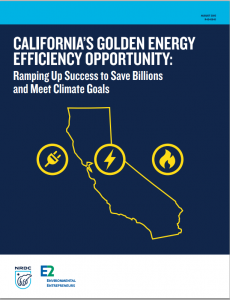Full Title: California’s Golden Energy Efficiency Opportunity: Ramping Up Success to Save Billions and Meet Climate Goals
Author(s): Lara Ettenson and Christa Heavey
Publisher(s): Natural Resources Defense Council
Publication Date: August 1, 2015
Full Text: Download Resource
Description (excerpt):
This report, a five-year update of California’s energy efficiency progress, shows California is ahead of schedule to reach its 32,000 gigawatt-hours (GWh) goal of using efficiency to cut emissions by 2020 and help the state meet its total pollution reduction target under the landmark Global Warming Solutions Act (AB 32), but a significant ramp-up is needed to meet California’s long-term climate and energy goals.2
Since the plan for implementing AB 32 was launched in 2008, California has saved enough electricity to cut its annual climate-warming greenhouse gas (GHG) emissions by more than 8 million metric tons, equivalent to the annual pollution from nearly 2 million cars.3 Eliminating this electricity generation also avoids hundreds of tons of sulfur oxide gases and nitrogen oxides, pollutants that contribute to health issues such as coughing, wheezing, and decreased lung function.4
Based on the state’s energy-saving achievements as of 2013 (the most recent complete data set available), NRDC estimates that efficiency could save Californians an additional $2 billion on their utility bills through 2015—$85 for the average household in this year alone—while avoiding another 10,000 gigawatt-hours (GWh) of electricity, 270 million therms (MMth) of natural gas, and the associated pollution. These savings are enough to serve over 1.5 million households for electricity and more than 500,000 households for natural gas for one year; together avoiding the carbon dioxide pollution equivalent to annual emissions from more than 1.5 million cars.
